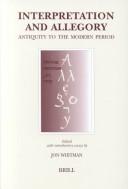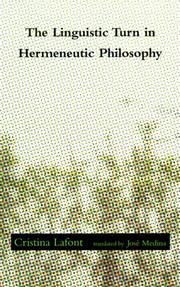| Listing 1 - 3 of 3 |
Sort by
|

ISSN: 09208607 ISBN: 1280464003 9786610464005 1417536500 9047400151 9781417536504 9789047400158 9789004110397 9004110399 9004110399 9781280464003 6610464006 Year: 2000 Volume: 101 Publisher: Leiden Brill
Abstract | Keywords | Export | Availability | Bookmark
 Loading...
Loading...Choose an application
- Reference Manager
- EndNote
- RefWorks (Direct export to RefWorks)
This is an unparalleled investigation of the theory and practice of interpretation. Concentrating on interpretive allegory, the volume simultaneously opens and organizes new approaches to over two thousand years of critical change. Its diverse topics extend from pagan, Jewish, Christian, and Islamic perspectives to postmodern inquiries. Its intersecting lines of analysis are drawn by scholars whose specialities range from ancient and modern literature to art history, comparative religion, and the history of philosophy. Framed by introductory essays assessing changes in scholarly research on allegory during the past century, the study has four principal parts: I) 'Antique Interpretation of Formative Texts'; II) 'Medieval Philosophic Designs'; III) 'Late Medieval and Renaissance Sign Systems'; IV) 'Eighteenth- to Twentieth-Century Theories of Allegory'. This provocative, unique revaluation provides an indispensable framework for future research. Contributors include: Peter M. Daly, David Dawson, Charles Dempsey, Paula Fredriksen, Warren Zev Harvey, Marc Hirshman, Moshe Idel, Alfred L. Ivry, Robert Lamberton, Joseph Mali, Giuseppe F. Mazzotta, A.J. Minnis, Rainer Nägele, Azade Seyhan, Tobin Siebers, Gregg Stern, Winthrop Wetherbee, and Jon Whitman. Interpretation and Allegory: Antiquity to the Modern Period is the recipient of The Polonsky Foundation 2001 Award for Contributions to Interdisciplinary Study in the Humanities, praising its unparalleled design and the far-reaching breadth of its research, and the unique framework it provides for future study. This publication has also been published in paperback .
Hermeneutics --- Allegory. --- PHILOSOPHY --- Personification in literature --- Symbolism in literature --- History. --- Hermeneutics. --- Allegory --- History --- Hermeneutics - History.

ISBN: 0262122170 026262169X 0262277867 0585190097 9780585190099 9780262277860 9780262122177 9780262621694 Year: 1999 Volume: *17 Publisher: Cambridge (Mass.) MIT press
Abstract | Keywords | Export | Availability | Bookmark
 Loading...
Loading...Choose an application
- Reference Manager
- EndNote
- RefWorks (Direct export to RefWorks)
Annotation The linguistic turn in German philosophy was initiated in the eighteenth century in the work of Johann Georg Hamann, Johann Gottfried von Herder, and Wilhelm von Humboldt. It was further developed in this century by Martin Heidegger, and Hans-Georg Gadamer extended its influence to contemporary philosophers such as Karl-Otto Apel and J?Habermas. This tradition focuses on the world-disclosing dimension of language, emphasizing its communicative over its cognitive function. Although this study is concerned primarily with the German tradition of linguistic philosophy, it is very much informed by the parallel linguistic turn in Anglo-American philosophy, especially the development of theories of direct reference. Cristina Lafont draws upon Hilary Putnam's work in particular to criticize the linguistic idealism and relativism of the German tradition, which she traces back to the assumption that meaning determines reference. Part I is a reconstruction of the linguistic turn in German philosophy from Hamann to Gadamer. Part II offers the deepest account to date of Habermas's approach to language. Part III shows how the shortcomings of German linguistic philosophy can be avoided by developing a consistent and more defensible version of Habermas' theory of communicative rationality.
Philosophy of language --- Theory of knowledge --- anno 1800-1999 --- Germany --- Language and languages --- Hermeneutics --- Philosophy, German --- Philosophy --- History --- -Hermeneutics --- -Language and languages --- -Philosophy, German --- -Foreign languages --- Languages --- Anthropology --- Communication --- Ethnology --- Information theory --- Meaning (Psychology) --- Philology --- Linguistics --- German philosophy --- Interpretation, Methodology of --- Criticism --- -History --- -Philosophy --- -Philosophy of language --- Foreign languages --- 19th century --- Philosophy [German ] --- 20th century --- SOCIAL SCIENCES/Political Science/Political & Social Theory --- PHILOSOPHY/General --- Language and languages - Philosophy - History - 19th century --- Hermeneutics - History - 19th century --- Philosophy, German - 19th century --- Language and languages - Philosophy - History - 20th century --- Hermeneutics - History - 20th century --- Philosophy, German - 20th century
Book
ISBN: 3110328097 311032850X 9783868380323 Year: 2009 Volume: n.s., v. 9 Publisher: De Gruyter
Abstract | Keywords | Export | Availability | Bookmark
 Loading...
Loading...Choose an application
- Reference Manager
- EndNote
- RefWorks (Direct export to RefWorks)
Bei der Studie handelt es sich um eine Paragraphen für Paragraphen erläuternde Interpretation der ""Philosophischen Untersuchungen"". Sie wendet sich an alle an Wittgensteins Philosophie Interessierte, insbesondere an Studierende und Schüler. Inhaltlich setzt sie einen Schwerpunkt auf die Sprachphilosophie. Didaktisch versucht sie, den Text Schritt für Schritt verständlich zu machen, und Wittgensteins - oft implizit bleibende - Auseinandersetzungen mit anderen philosophischen Positionen (der philosophischen Tradition und der analytischen Sprachphilosophie) deutlicher hervortreten zu lassen. Da
Hermeneutics -- History -- 19th century. --- Language and languages -- Philosophy -- History -- 19th century. --- Language and languages -- Philosophy -- History -- 20th century. --- Philosophy & Religion --- Philosophy --- Language and languages --- Philosophy. --- Wittgenstein, Ludwig, --- Wei-tʻe-ken-ssu-tʻan, --- Wei-tʻe-ken-ssu-tʻan, Lu-te-wei-hsi, --- Wittgenstein, L. --- Vitgenshteĭn, L., --- Wei-ken-ssu-tʻan, --- Pitʻŭgensyutʻain, --- Vitgenshteĭn, Li︠u︡dvig, --- Weitegenshitan, --- Wittgenstein, Ludovicus, --- Vitgenshtaĭn, Ludvig, --- ויטגנשטיין, לודוויג --- 维特根斯坦, --- Wittgenstein, Ludwig Josef Johann,
| Listing 1 - 3 of 3 |
Sort by
|

 Search
Search Feedback
Feedback About UniCat
About UniCat  Help
Help News
News